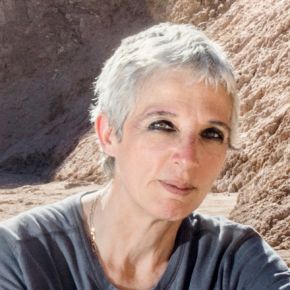
SETI Institute
Exploration, whatever its focus, is limitless, multi-facetted, and exquisitely complex. The understanding of how and why planets evolve, whether they could have hosted habitats for life, how climate change impacts their habitability - and for Earth, its biodiversity - are questions that need to be addressed through a synergetic approach by looking at many different and complementary angles simultaneously. Nathalie’s vision of exploration reflects this philosophy. Exploration takes Nathalie from Mars to the summit of the highest volcanoes in the Andes, to the bottom of lakes, and to the most arid deserts in the world. She bridges planets by deciphering their past from the present and their present from their past, and builds a vision of their future.
Nathalie has been a Principal Investigator (PI) at the SETI Institute since 1998. She leads projects in planetary science and astrobiology, develops science exploration strategies for Mars, Titan, and the Outer Solar System icy moons, and designs robotic field experiments. She explores high altitude lakes in the Andes where environmental conditions are analogous to early Mars. With her team, she documents life’s adaptation to extreme environments, the effect of rapid climate change on lake ecosystems and habitats, its geobiological signatures, and relevance to planetary exploration.
Nathalie was the spokesperson for the selection of Gusev crater as the landing site for the Mars Exploration Rover (MER) mission Spirit rover and is a member of the MER science team since 2002. She was the Science PI of the NASA Nomad rover field experiment (1997), and other NASA ASTEP-funded science and technology projects including Life in the Atacama (2003-2006) and Subsurface Life in the Atacama (2011-2015). She is the PI of the NASA ASTEP Planetary Lake Lander project (2011-2015) that explores the impact of ice loss on planetary lakes using technology developed for the exploration of Titan. Since January 2015, she is the PI of the SETI Institute NASA Astrobiology Institute (NAI) team that seeks to understand the impact of rapid environmental change on habitability and biosignature potential on Mars. She counts over 340 peer-reviewed publications and proceedings of professional conferences. She is the author of 3 books, and 7 chapters of books on the subject of planetary science and exploration, astrobiology, and terrestrial extreme environments.
Nathalie's work is featured in the US and international media (e.g., Discovery Channel, NOVA, M6, BBC, National Geographic, Scientific American, Popular Science, New, New Einsteins, TED, Tested.com, other) and in popular books (e.g., The Martian Race, Gregory Bendford, Warner Books; Almost Human: Making Robots Think, Lee Gutkind, Norton & Company, Inc; Are We Alone? Gloria Skurzynski, National Geographic Society; Mapping Mars: Science, Imagination, and the Birth of a World, Macmillan).
Nathalie is the recipient of NASA and other research awards. She was elected Carey Fellow in 2007, Women of Discovery (Air and Space) Wings Worldquest Fellow (2005), and received the International Women Leadership Association Award in 2012. Education and Public Outreach (E/PO) has a central place in her work. She mentors students in the field and in the lab., and meets with them in schools. All of her projects involve a large E/PO component. To date, she has given over 400 public lectures on the subjects of planetary science, exploration, and astrobiology.
